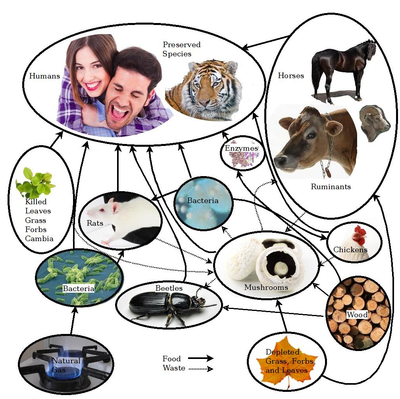J.M.Pearce (talk | contribs) m (→Abstract) |
J.M.Pearce (talk | contribs) m (→Abstract) |
||
| (One intermediate revision by the same user not shown) | |||
| Line 16: | Line 16: | ||
This study estimates the price of alternate foods during a catastrophe in line with global trade and information sharing, but factors such as migration, loans, aid or conflict are not taken into consideration. | This study estimates the price of alternate foods during a catastrophe in line with global trade and information sharing, but factors such as migration, loans, aid or conflict are not taken into consideration. | ||
'''Findings | '''Findings''' | ||
''' | |||
Without alternate foods, for a five-year winter, only approximately 10 per cent of the population would survive. The price of dry food would rise to approximately $100/kg, and the expenditure on this food would be approximately $100tn. If alternate foods were $8/kg, the surviving global population increases to approximately 70 per cent, saving >4billion lives. | Without alternate foods, for a five-year winter, only approximately 10 per cent of the population would survive. The price of dry food would rise to approximately $100/kg, and the expenditure on this food would be approximately $100tn. If alternate foods were $8/kg, the surviving global population increases to approximately 70 per cent, saving >4billion lives. | ||
| Line 27: | Line 27: | ||
The probability of loss of civilization and its impact on future generations would be lower in this scenario, and the total expenditure on food would be halved. | The probability of loss of civilization and its impact on future generations would be lower in this scenario, and the total expenditure on food would be halved. | ||
''' | |||
Originality/value''' | '''Originality/value''' | ||
Preparation for alternate foods is a good investment even for wealthy people who would survive without alternate foods. | Preparation for alternate foods is a good investment even for wealthy people who would survive without alternate foods. | ||
Revision as of 13:22, 20 August 2018
Source
- David C. Denkenberger, Joshua M. Pearce, Ray A. Taylor, Ryan A. Black, Food without sun: Price and life-saving potential. Foresight (2018, in press). open access https://doi.org/10.1108/FS-04-2018-0041
Abstract

Purpose
The purpose of this study is to estimate the price and life-saving potential of alternate foods. The sun could be blocked by asteroid impact, supervolcanic eruption or nuclear winter caused by burning of cities during a nuclear war. The primary problem in these scenarios is loss of food production. Previous work has shown that alternate foods not dependent on sunlight, such as bacteria grown on natural gas and cellulose turned into sugar enzymatically, could feed everyone in these catastrophes, and preparation for these foods would save lives in a manner that is highly cost-effective.
Design/methodology/approach
This study estimates the price of alternate foods during a catastrophe in line with global trade and information sharing, but factors such as migration, loans, aid or conflict are not taken into consideration.
Findings
Without alternate foods, for a five-year winter, only approximately 10 per cent of the population would survive. The price of dry food would rise to approximately $100/kg, and the expenditure on this food would be approximately $100tn. If alternate foods were $8/kg, the surviving global population increases to approximately 70 per cent, saving >4billion lives.
Research limitations/implications
A nongovernmental mechanism for coordinating the investments of rich people may be possible. Identifying companies whose interests align with alternate food preparations may save lives at a negative cost.
Practical implications
The probability of loss of civilization and its impact on future generations would be lower in this scenario, and the total expenditure on food would be halved.
Originality/value
Preparation for alternate foods is a good investment even for wealthy people who would survive without alternate foods.
Keywords
alternate food; global catastrophic risk; nuclear war; existential risk; economics; food
See Also
| Feeding Everyone No Matter What |
|---|
Error in widget YouTube: Unable to load template 'wiki:YouTube' |

- Feeding Everyone No Matter What - The full book main page
- David Denkenberger and Joshua Pearce, Feeding Everyone No Matter What: Managing Food Security After Global Catastrophe , 1st Edition, Academic Press, 2015
- Free Preview: Google books
- Cover on Academia
- Facebook page
- Alternative Foods as a Solution to Global Food Supply Catastrophes
- Resilience to global food supply catastrophes
- Feeding Everyone if the Sun is Obscured and Industry is Disabled
- Cost-Effectiveness of Interventions for Alternate Food to Address Agricultural Catastrophes Globally
- Dave Denkenberger Publications
- Feeding Everyone: Solving the Food Crisis in Event of Global Catastrophes that Kill Crops or Obscure the Sun
- Cost-effectiveness of interventions for alternate food in the United States to address agricultural catastrophes
- OSE Wiki "Synfood" (i.e. protein and other dietary components from microbial organisms fed on gas or other hydrocarbons)





